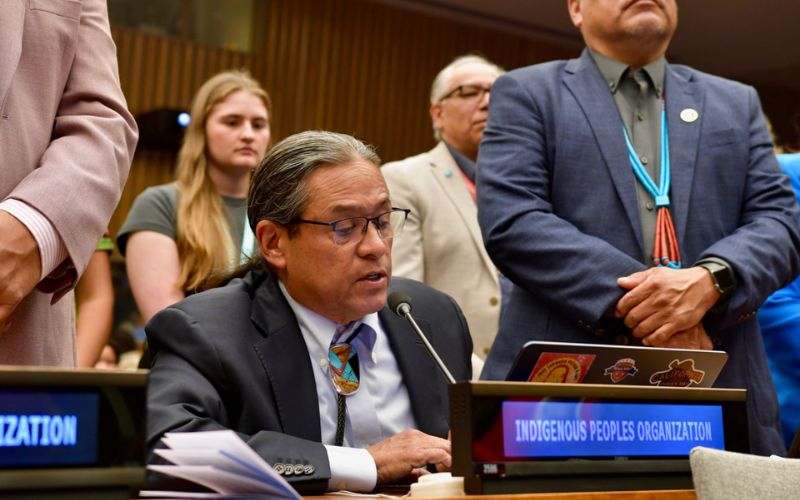
- Details
- By Jenna Kunze
On the floor of the United Nations Permanent Forum on Indigenous Issues (UNPFII) in New York City last week, National Congress of American Indians President Mark Macarro gave a statement advocating for advanced participation of Indigenous Peoples.
Enhanced Participation refers to a process Indigenous Peoples have been advocating for for over a century, beginning in 1923 with the League of Nations, that would put Indigenous leaders closer to the level of member states at the United Nations (U.N).
Currently, Indigenous leaders are excluded from high-level U.N. bodies like the General Assembly, which decides the U.N. budget, elects member states to the Security Council, and sets other key international goals and policies. Additionally, Native people are only able to participate in the UN system as non-governmental organizations, rather than tribal nations.
Last April at the UNPFII, Csaba Kőrösi, President of the General Assembly, held a final hearing on enhanced participation of Indigenous peoples.
“While member states are the decision makers, Indigenous Peoples have an opportunity to significantly shape those decisions. Indigenous Peoples must have those opportunities,” Kőrösi said.
On Tuesday, Chairman Macarro, a member of the Pechanga Band of Indians in California, echoed Kőrösi’s sentiment on the floor of the UNPFII.
“As sovereign peoples who have governed ourselves on our homelands since time immemorial, we should rightfully be able to fully participate in the community of Nation-States,” Macarro said in a statement he read, obtained by Native News Online. “Indigenous Peoples have been carrying out governance activities since time immemorial— long predating the formation of the state members of the United Nations…Our governance mechanisms include, among other things, governing councils, parliaments, and traditional authorities.”
Macarro called for the development of a new status for Indigenous Peoples that would allow them participation in the UN system, while also distinguishing them from NGOs, national human rights groups, and other non-tribal communities.
“This reframing is correct and imperative, as the current reference is improper for sovereign entities possessing the right to self-determination,” Macarro said.
More Stories Like This
Navajo Nation Declares State Of Emergency As Winter Storm Threatens RegionThe Prediction Market Boom is Posing an Existential Threat to American Indian Gaming
NARF Condemns ICE Actions, Says Native Americans Unlawfully Detained
United Indian Nations of Oklahoma Urges Tribal Citizens to Carry ID Amid ICE Enforcement Actions
Oglala Sioux Tribe Rejects ICE Conditions for Information on Detained Members
Help us defend tribal sovereignty.
At Native News Online, our mission is rooted in telling the stories that strengthen sovereignty and uplift Indigenous voices — not just at year’s end, but every single day.
Because of your generosity last year, we were able to keep our reporters on the ground in tribal communities, at national gatherings and in the halls of Congress — covering the issues that matter most to Indian Country: sovereignty, culture, education, health and economic opportunity.
That support sustained us through a tough year in 2025. Now, as we look to the year ahead, we need your help right now to ensure warrior journalism remains strong — reporting that defends tribal sovereignty, amplifies Native truth, and holds power accountable.
 The stakes couldn't be higher. Your support keeps Native voices heard, Native stories told and Native sovereignty defended.
The stakes couldn't be higher. Your support keeps Native voices heard, Native stories told and Native sovereignty defended.
Stand with Warrior Journalism today.
Levi Rickert (Potawatomi), Editor & Publisher


